GENERAL INFORMATION FOR VISITORS
Climate at Bengaluru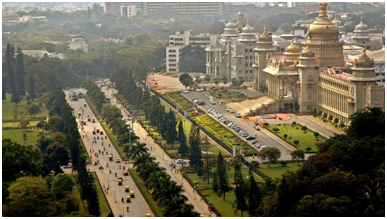
Bengaluru in September is pleasantly cold. Those coming from hotter climate might find it quite chilly but for those who are used to colder climates might find it very manageable, with the temperature as low as 20°C (70°F) and high up to 28°C (80°F), approximately.
Clothing
There is no particular dress code for the conference. However, pack a few layers which you may require in the mornings and evenings.
Time
India has only one time zone which covers the entire country. Indian Standard Time (IST) is 5 hours and 30 minutes ahead of GMT.
Language
The official language of the conference is English. English, Hindi and Kannada are the languages spoken in the city.
Local Commuting
Taxis are easily available in Bengaluru with Ola & Uber being the leading Metered/ Radio taxis.
Tuk-tuks (called autos & 3-wheelers in local lingo) are common mode of transport and are readily available at every corner of the city.
Bengaluru Metro is, clearly, the quickest, affordable and one of the best ways to get around the city. However, kindly confirm if the metro covers the place you want to visit.
At the airport, KSTDC (Karnataka State Tourism Department) has a taxi stand with metered taxies available 24/7 – just outside the arrival gate.
There are private taxi providers also available with whom a cab can be booked inside the airport, which will be slightly more expensive as compared to the radio/ metered taxies.
Electricity 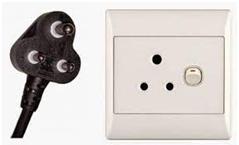
The voltage in India is 230 volts. You will require a voltage converter if you are carrying a device that does not accept 230 Volts. Wall sockets accept plugs with two or three round pins. Should you wish to use appliances of 110 volts, most Conference Hotels will provide adaptors on request but it may be useful to carry your own for convenience. Most laptops have adaptors that accept 110-240 volts, but will still need plugs of the type shown below.
Typical Indian 3-Pin and 2-Pin plugs. The separation between the two smaller round pins is 2 cm.
Visa
All Visitors coming from overseas will require a valid visa. Visas can be obtained from the Indian missions abroad through application where a sticker is required in the passport (non-ETA). One should possess a valid passport.
Currency
1 Euro = 91 INR
1 USD = 83 INR
1 GBP = 106 INR
1 AUD = 56 INR
The above currency values are subject to change. Please log onto www.xe.com to calculate the approximate current currency values. The above rate of exchange changes every day therefore the current date rate to be taken at the time of calculation.
Banks
All the International Banks are represented by Branches in Bengaluru. Bank Hours are 9:30 AM – 6:00 PM from Monday to Friday and 9.30 am -1.30 pm on Saturdays. The 2nd& 4th Saturdays in the month are holidays for the banks in India.
Credit Cards
American Express, Visa, Master Card etc. are generally accepted in the major hotels and shops. However, you are advised to confirm with the merchant if they would accept cards beforehand.
Safety and Security
- • Follow the same rules of safety that you follow while travelling anywhere else with respect to using hotel safe deposit boxes and keeping travel documents safe.
- • When in public places, keep them in your hotel or with you all the time when moving about.
- • Always carry the hotel address with you when you leave the hotel.
Water
Recommended to drink bottled water. Do not drink water from the tap. However, the tap water is safe to brush your teeth.
Smoking Policy
All public areas are non-smoking except for specifically labelled smoking areas.
Alcohol Consumption
There are plenty of shops selling liquor of all varieties where the price will be around 50% less than the same brand served in a hotel.
The pubs/ bars/ restaurants generally follow 11.00 PM as the cut-off for last order, unless mentioned specifically. Individuals who wish to continue to partake of alcoholic beverages after 11.00 PM. may only do so via room service orders within hotels.
Insurance and Liability
The organizers do not take responsibility for any individual, medical, travel or personal insurance. Participants are advised to secure their own insurance policies before departure from their countries, as required.
While every attempt is made to ensure efficient, trouble-free hospitality, including hotel accommodation, sightseeing and tours, participants are advised that no liability accrues to the Organizers in the event of any necessary modifications, including change in itineraries for tours due to delays or cancellations of flights/other exigencies beyond the Organizers' control.
Restrictions on Export of Articles
- • Export of all wild animals indigenous to the country and articles made from such listed animals like skins, pelts, furs, ivory, rhino horns, trophies are totally banned.
- • Banned items do not include peacock feathers and handicrafts made from them.
- • Antiques which include sculpture, painting or other works of arts or crafts illustrative of science, art, craft, religion of bygone ages and of historical interest which have been in existence for not less than 100 years may not be exported from India.
- • Manuscripts or other documents of scientific, historical literary or aesthetic value in existence for not less that seventy-five years: art treasures not necessarily antiques but of artistic or aesthetic value, also cannot be exported out of India
Food and Drink
- • Be careful what you eat. Steer clear of uncooked or unpeeled fruit and vegetables outside the hotels / quality restaurants. Do sample local restaurants too, but use your good judgment. If it looks iffy, take a pass.
- • Eat meats only in restaurants of a good hygienic standard.
- • Curd or yoghurt is served with most Indian meals. It is a natural aid to digestion and helps to temper the spicy food too.
- • Do not eat fried food cooked in the streets.
Tipping and Gratuities
Tipping Practices are similar to most other parts of the world. Most restaurants include a service charge of 10% in the bills, but tipping in general is at customers’ discretion which could vary from 2% to 8%. The local currency is preferred while tipping. Naturally, it’s never compulsory and should only be done if you’re happy with the service. However, tipping is not a very common practice while using a radio taxi/ call taxi (like Uber, Ola) or even autos (tuk-tuks).
Others
- • Keep extra photocopies of the relevant pages of your passport in a safe place.
- • Taxi and auto-rickshaw fares keep changing, and therefore do not always conform to readings on meters. Insist on seeing the latest rate card, available with the driver, and pay accordingly. Avoid taxis that pick up additional passengers.
- • Be wary of impostor porters or guides. Assure that they are properly uniformed or identified. Never leave your luggage, briefcase, laptops or other items unattended.
- • Insist on the taxi / auto meter being flagged down in your presence.
- • In cities you can change most major foreign currencies and brands of travellers’ cheques but you’ll widen your options and save yourself hassles if you stick to US dollars or pounds sterling.
Traffic/Horn Blowing
The rules of the road are simply very different here in India. Traffic generally is much slower than in some other parts of the world, and it is very common to see animals amongst moving traffic. Use great caution when crossing streets. Horn blowing is deemed precautionary and is a constant 24-hour reality.
Commonly used local language translations
| English | Hindi |
| Hello | : Namaskar or Namaste |
| I need a Taxi | : Taxi chahiye |
| Stop | : Roko |
| Let’s Go | : Chalo |
| How much does it cost | : Kitna Rupee hua ? |
| Could you please help me | : Kya aap meri madadkarenge ? |
| Water | : Paani |
| Tea | : Chai |
| Understand! | : Samjhe ! |
| Can you give me directions | : Kya aapmujhe rasta bata sakte hain ? |
| What is your name | : Aapka naam kyahai ? |
| My Name is. ___ | : Mera naam _______ hai |
About India 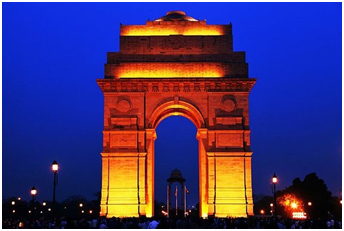
A land of remarkable diversity – from ancient traditions and artistic heritage to magnificent landscapes and culinary creations – India will ignite your curiosity, shake your senses and warm your soul. India remains one of the most ethnically diverse countries in the world.
Some interesting facts about India:
- • When many cultures were only nomadic forest dwellers over 5000 years ago, Indians established Harappan culture in Sindhu Valley (Indus Valley Civilization).
- • The name ‘India’ is derived from the River Indus, the valleys around which were the home of the early settlers. The Aryan worshippers referred to the river Indus as the Sindhu.
- • Chess was invented in India.
- • Algebra, Trigonometry and Calculus are studies, which originated in India.
- • The ‘Place Value System’ and the ‘Decimal System’ were developed in India in 100 B.C.
- • India is the largest democracy in the world, the 7th largest Country in the world, and one of the most ancient civilizations.
- • Ayurveda is the earliest school of medicine known to mankind. The Father of Medicine, Charaka, consolidated Ayurveda 2500 years ago.
- • The oldest European church and synagogue in India are in the city of Cochin. They were built in 1503 and 1568 respectively.
- • Varanasi, also known as Banaras, was called “the Ancient City” when Lord Buddha visited it in 500 B.C., and is the oldest, continuously inhabited city in the world today.
- • Yoga has its origins in India and has existed for over 5,000 years.
General Travel Information
Winter
November - February
Summer
March - May
Rainy Season
June - October
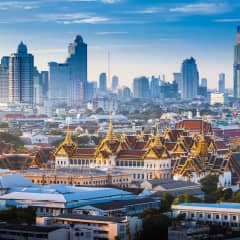
Bangkok
The city has one of the highest average temperatures in the world, with pronounced hot and rainy seasons. Temperatures are usually above 30°C and lows don't usually go below 20°C. It is almost always humid.
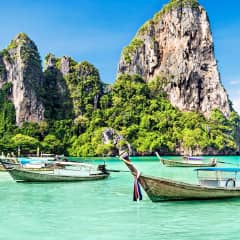
Southern Thailand
A mostly tropical climate with rainfall occurring through the year with pockets of micro-climates. Temperatures are more even year-round with average high of 28-30°C.
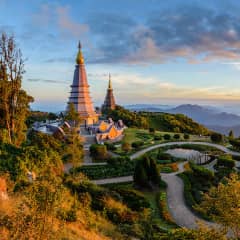
Northern Thailand
Higher elevations in some areas mean a cooler overall climate. It is somewhat drier than the central and coastal regions, with the odd rare freeze.
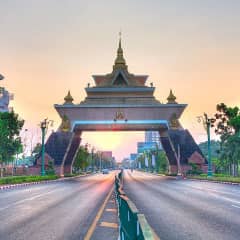
Northeast Thailand or ‘Isan’
The winter period from October to February is the best time to visit this mountainous region. Temperatures are cool and local flora come alive during this season. Avoid the rainy seasons as some provinces may experience flooding.
Transporting
Bangkok has a well-connected infrastructure, with extensive routes covered by a variety of local transport.

BTS
The Bangkok Mass Transit System (BTS), or ‘Skytrain’ as it is also known by, is an inexpensive and convenient way to get around the city above the fray. There are two lines that serve major commercial areas, with a central hub at Siam Station. The train operates from 06:00 to 24:00 daily.

MRT
The Metropolitan Rapid Transit (MRT) is Bangkok’s underground train system, and an equally inexpensive way to move about. It also serves popular areas and is connected to the BTS via Silom (MRT) to Sala Daeng (BTS), Sukhumvit (MRT) to Asoke (BTS), and Chatuchak Park (MRT) to Mo Chit (BTS). The train operates from 06:00 to 24:00 daily.

BRT
The Bus Rapid Transit (BRT) is a fast and intelligent mass transport that plies the roads. It connects passengers quickly to the BTS. It serves Narathiwat Road and Rama 3, beginning at Sathorn Station and ending at Ratchaphruek Station. It includes 12 stations in total and operates from 06:00 to 24:00 daily.

Airport Rail Link
The newest service is a straight beeline between Suvarnabhumi International Airport and the north of downtown at Phaya Thai Station. It takes about 30 minutes including stops along the way at Rajprarop Station, Makkasan Station, Ramkhamhaeng Station, Hua Mak Station, Thab Chang Station, and Lad Krabang Station. The train operates from 06:00 to 24:00 daily.

Taxi
A litany of colourful taxis service the city. Hop into a metered vehicle and enjoy low fares relative to other major cities around the world. Popular apps for booking include Grab and All Thai Taxi, with options to pay via credit cards.

Others
There are thousands of buses that ply the city. An extensive network of highways also lead to easy access to almost any part of Thailand using long-haul coach or rail options. Domestic air travel has also given visitors a comfortable and fast way to explore the country, with most destinations no more than one or two hours away from Bangkok.

Thailand Information
The Kingdom of Thailand is a vibrant collection of venues, culture, and stories. We’ve compiled some useful information to help you get familiar.
Time
Thailand Standard Time (THA) is GMT +7 Daylight savings is not observed.
Money
Thailand’s currency is the Thai Baht (THB). Denominations include 20, 50, 100, 500, and 1,000 in notes.
Electricity
Thailand uses 220V AC outlets. 2-prong round or flat sockets are the most common. A converter and adapter is required for most visitors from the U.S. and U.K.
Communications
Thailand has numerous satellite, cellular and Wi-Fi providers with excellent connectivity. All major mobile brands are available and compatible with local telecom networks.
Other Useful Contact
| 1133 | Fixed telephone directory assistance |
| 1182 | Thai Meteorological Department |
| 1543 | Service Centre traffic on the Turnpike (U.S. Route) |
| 1348 | Bus route enquiry (BMTA bus) |
| 1690 | State Railway of Thailand |
| 02 617 7300 | Bangkok Mass Transit System (BTS) |
| 02 624 5200 | Metropolitan Rapid Transit (MRT) |
| 1197 or 02 515 3020 | Traffic Command and Control Centre |
Announcements
- Registration is closed
- Abstract submission is closed
- Travel and accommodation grant available for paid member till August 31, 2023
- To check eligibility and become a member of AHAD-AP, click here








